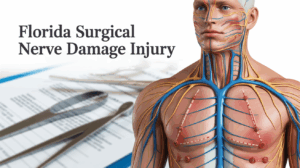
Yes, parents can seek compensation for neonatal injuries if a healthcare provider acts negligently and causes a newborn to suffer a preventable injury during or after birth. A successful medical malpractice claim will provide compensation for medical expenses, therapies, and other damages.
Compensation is critical for these families because some neonatal injuries lead to permanent disabilities, significant developmental delays, and lifelong medical needs. Parents could face overwhelming financial costs to ensure their child has the best life possible. If this happened to your family, working with a Florida medical malpractice lawyer will allow you to focus on your child while your legal team navigates the claims process and fights for justice.
What Are The Recoverable Damages In A Neonatal Injury Case?
Families can recover both economic and non-economic damages in neonatal injury malpractice cases. These damages could include money for:
- Medical expenses, such as hospitalization, surgeries, and medications
- Future care, support, and ongoing care needs
- Rehabilitation and therapy, such as physical, occupational, or speech therapy
- Special education
- Mobility and assistive devices
- Home modifications for disabilities
- Loss of the child’s future earning capacity
- Pain and suffering
- Other intangible losses
There is no average birth injury settlement, as these values can vary widely, as no two cases are alike. A birth injury attorney can evaluate your circumstances, estimate the value of your claim, and fight for the full compensation your family deserves.
What Factors Might Affect The Settlement Or Verdict In These Cases?
The biggest factor that will affect the outcome of your child’s birth injury case is the severity of the injuries and the long-term effects they will face. A child with a minor impairment or temporary condition is likely to receive less compensation than one with a permanent disability that will require lifelong care.
Other factors that could affect the potential award or settlement include:
- The child’s prognosis and life expectancy
- The cost of future medical care and accommodations
- Whether the injury affects the child’s ability to live independently or earn a living
- Emotional and psychological effects on the child and family
Our attorneys work with experts to document the child’s prognosis, ongoing treatment, and future needs. This ensures we are accurately projecting future care costs and have strong evidence to support the demand for fair compensation.
What It Takes To Prove Medical Negligence In A Neonatal Injury Case
To hold a medical provider legally responsible for a neonatal injury, you must show the accused party acted negligently. This usually occurs when they fail to provide an acceptable standard of care and the child suffers injuries.
Our birth injury attorneys understand what we must prove to hold the healthcare provider or facility responsible. This includes:
- A doctor-patient relationship existed, and the provider owed a professional duty of care to the mother and child
- The provider did not provide the standard of care expected of someone with their training and experience under similar circumstances
- The provider’s actions or inactions directly caused or substantially contributed to the infant’s injury
- The injury resulted in quantifiable losses
One of the keys to winning compensation based on a neonatal injury is having strong expert testimony in the case. This testimony is mandated by Florida law and must be submitted with the initial notice that indicates your intent to file a lawsuit. This testimony must come from a qualified medical expert who reviewed the medical records and other documentation and agrees the case has merit.
What Types Of Injuries Can Malpractice Cause And How Do They Affect Babies?
When doctors and other care providers act negligently during delivery and immediately after birth, it can result in a wide range of injuries and varied outcomes for these babies. Some types of neonatal injuries include:
- Hypoxic-Ischemic Encephalopathy (HIE): This type of injury involves oxygen deprivation during labor or delivery and can cause brain damage or cerebral palsy.
- Brachial Plexus Injuries: These injuries are the result of excessive force during delivery. They can cause temporary or permanent nerve damage, arm weakness, or arm paralysis. Erb’s palsy is a common example.
- Head Injuries: Neonatal head injuries can include skull fractures, infant brain injuries, and intracranial hemorrhages. These could occur because of the improper use of forceps or vacuum extractors, or physical trauma to the newborn’s head.
- Infections: Undiagnosed and untreated infections can lead to sepsis or meningitis in newborns. Doctors should monitor mothers and babies for signs of infection.
- Kernicterus: Failure to diagnose, monitor, and treat jaundice can lead to brain damage.
Some babies live with permanent disabilities, cognitive impairments, and motor delays for the rest of their lives because of neonatal injuries. Negligence that causes a birth injury could affect the child’s quality of life and cause them to need lifelong support and monitoring. Those responsible deserve to be held accountable.
Who Is Liable For My Child’s Neonatal Malpractice Injury?
Who might be liable for your child’s injuries depends on what happened and which parties acted negligently. Some possibilities include:
- Obstetricians who failed to monitor fetal distress or call for a necessary C-section
- Nurses or delivery room staff who fail to follow protocols
- Hospitals with issues such as understaffing, lack of training, or lack of oversight for staff
- Pediatricians or neonatologists who failed to provide an acceptable standard of care
When birth injuries occur, it is often because more than one system failed or more than one care provider did not offer an acceptable standard of care. Our team is dedicated to identifying all responsible parties in your case and helping you hold them accountable.
Does The Victim Being An Infant Affect The Deadline In The Case?
Florida’s statute of limitations for medical malpractice claims, Florida Statutes § 95.11, is typically two years from the date the injury was discovered (or should have been). However, in cases involving minors, the deadline can differ. Parents generally have more time.
These cases also have a pre-suit notice requirement. This means you must have your case ready to go and notify the accused party or parties of your intentions at least 90 days in advance. This provides a 90-day investigation period for all involved parties.
Discuss Your Child’s Neonatal Injuries With Our Medical Malpractice Team
At Anidjar & Levine, we provide free consultations for families whose child suffered a neonatal injury. We will explain how our Florida medical malpractice lawyer can help you get justice. Call today.










